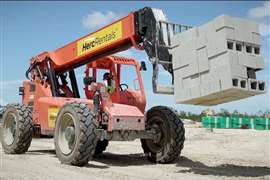Getting a PAL
02 April 2008
Having discovered over consecutive Christmases that I have absolutely no talent for driving remote controlled vehicles, I approached the prospect of attaining my PAL (Powered Access License) card with a degree of unease. However, the warm welcome from our instructor, Michael Tordoff, and a cup of tea soon had me feeling more relaxed.
Mr Tordoff is an instructor at Operator Training Services where Patrick Hill, AI's Assistant Editor, and I were invited to take our scissor lift and articulated boom PAL card course. OTS is a dedicated UK training company with facilities in Ashford, Kent and Godstone Surrey, specialising in courses connected to working at height. Joining us on the course were Danny Urquhart and Dave Phillipson from Saxon Fabrication, Gillingham, Kent. IPAF insists that there are never more than four trainees on the PAL card course, one of its stringent criteria.
Pre-theory test
Mr Tordoff began with a short overview of the day while we filled out the necessary paperwork. Michael has many years experience in both working at height and training; he first came across powered access platforms in the 1980s when a forward thinking employer invested in a scissor lift from the US, “At the time,” he said, “we never thought it would catch on.” Now, training operators in the use of powered access equipment is a major part of his business. OTS also teaches courses certified by PASMA (Prefabricated Access Suppliers' and Manufacturers Association) and the British Ladder Manufacturers' Association.
Our first task as trainees is to carry out a ‘pre-theory' multiple choice test. As my knowledge of the access industry is still in its infancy I expect to do particularly badly, but I quickly discover that answering the questions is mostly common sense. The pre-test results allow the instructor to focus on areas where candidates' knowledge might be weak.
After the test we are shown a video, this introduced the concept of powered access, described the various types of equipment and outlined safe operating practice. Answers to all of the test questions were given in the film. Even as a novice I found the tone of the video slightly patronising in places, however, some very useful information about making methodical checks on the equipment, legal requirements and safety issues were covered.
As well a diesel machines, OTS operates an electric scissor lift and an electric articulated boom at its Ashford site. Training can be carried out in a hanger-like shed so, when the weather is poor, training continues with minimum discomfort to all concerned.
Mr Tordof likes to break up the classroom and practical parts of his training days because he is well aware that many of his trainees are used to being very active during the day and do not enjoy long periods at a desk. So outside, in appropriate safety gear, we divided into teams of two and took it in turns to give the Genie scissor lift and the Niftylift articulated boom their pre-operation checks – once, of course, Mr Tordof had demonstrated all the relevant points. Now confident that the equipment is safe and that we know how to operate it, we are allowed some time to practice.
Trouble with steering
To start with, I am extremely tentative, but once I work out how to keep the machine at ‘tortoise pace' and keep my eye on the wheels so I know which way I'm going, it becomes easier. I'll never be ‘a natural' but I'm starting to believe I could pass the course.
It could be that trainees are already proficient in operating access equipment, however, increasingly companies will not allow anyone who does not hold a relevant PAL card to work at height on MEWPs (mobile elevated platforms), even if they are in the company of a trained operator. Our co-trainees were in exactly that position: Dave and Danny are skilled fabricators about to start work in a paper mill, re-cladding rolling machinery with stainless steel. The management at the paper mill will not let them work from aerials without appropriate training, and that meant a obtaining a PAL card.
Some near misses with the scissor lift later (I'm finding the articulated boom much easier to steer) we stop for lunch, then we run through the IPAF presentation about safety which is littered with video images of stick men plummeting to their doom from platform baskets. It's time to take the theory test for real and we must get at least 20 of the 25 questions correct. By now, though, I find I know all the answers and score 100%. So does Patrick.
Success
Now for the real test, we must manouevre the equipment round a course raising and lowering the platform. To hit anything is an immediate fail and, for each mistake made, points are scored: more than 20 and you fail. I am very happy to score just ten points on the scissor and 13 on the articulated boom.
All four trainees pass, we are issued with our log books and will receive our PAL Cards in a few days; the card is valid for five years.
No training course can perfectly suit every trainee's skill level and experience and, once a trainee becomes a PAL Card holder, it is up to individuals to motivate themselves to carry out relevant safety checks and become familiar with any equipment they use. If you are concerned the course will be heavy on the theory and a bit hard going, it isn't, the majority of the content is highly relevant and the small numbers on the courses means that they can be tailored very much to your particular needs.
I doubt I will ever gain the sort of proficiency on access platforms that will have me whipping around a construction site like a professional, but the course has made me confident enough to climb into a basket and put a machine through its paces. Something that I suspect will be very useful in this job.






